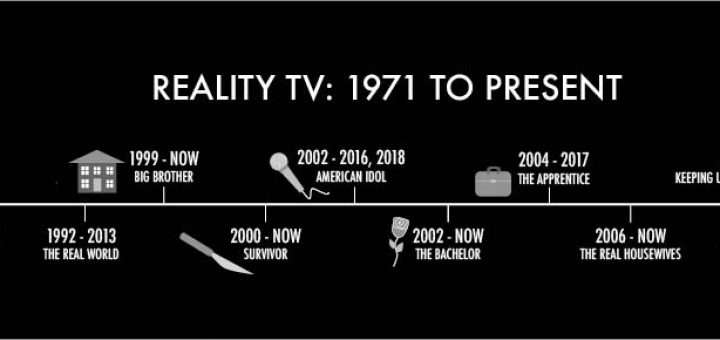Keeping up with reality TV

How reality television continues to thrive
By Colin Macgillivray, Arts Editor
Since the dawn of time, there has never been anything more fascinating than watching real human beings compete, interact or fall in love through the lens of a camera. Whether it be rich moms fighting over mixed drinks, or estranged family members competing to see who can eat the most rotting fish, reality television has completely dominated cable television since its inception.
Surprisingly, the beginning of reality television is not so different than it is today. PBS’s 1971 production of An American Family acted as a pseudo-documentary that slowly transitioned into the model that mainstream shows like Keeping Up with the Kardashians and The Real Housewives series follows. Credited as the first ‘reality’ television series, An American Family, which chronicled the daily life of the Loud family, is an absolutely fascinating watch, due to how the documentary nature of the project shifted into something that felt real and genuine, rather than over-produced and scripted. With natural storylines emerging, such as the separation and subsequent divorce of the Bill and Patricia Loud and the coming out of their son, Lance Loud, An American Family essentially created its own genre by accident. The public was fascinated, as they could relate to the what was essentially the everyday life of a family. It was revolutionary, but with any new revelatory form of entertainment come a slew of problems and controversies. Reality television was no different.
First off, something has to be made clear before diving deeper into the wild world of reality shows. It is not reality. It’s heavily edited, over-produced and largely scripted to fit a desired narrative. Now this might be incredibly obvious to some, but there is no denying that a large percentage of reality television viewers insist that what they are consuming is 100 per cent factual. Just check the comment section of any Facebook post involving the Kardashians. There are still a plethora of people out there who insist that Kim’s marriage to Kris Humphries was real, when in reality, it is safe to say that it was a massive publicity stunt. Spencer Pratt, an infamous cast member of The Hills, even admitted to fabricating conflict with his now wife, Heidi Montag, to ensure the two of them would have ample screen time. Conversations are edited down to make them seem like something entirely different, while ‘cast’ members who don’t play their role are usually unceremoniously removed from the show. Royce Reed, of the ridiculous Basketball Wives, was cut from the show because she refused to play ball with the other wives.
So, if it’s all one big sham, how in the world is reality television still thriving?
Well, for one, competition based reality shows are absolutely fascinating to watch. Survivor has been dominating cable television for almost two decades and it still manages to pull in almost 10 million viewers an episode. The Bachelor and The Bachelorette have also managed to remain relevant for 15 years, because nothing is more exciting than watching 25 men compete over one woman. Through careful editing and consumer manipulation, both Survivor and The Bachelor franchises are able to craft compelling heroes, villains and scenarios that any viewer at home can re-hash themselves. Both television shows are masterful in the way that they include their audiences indirectly, giving faithful fans a chance to scream over a brilliant blindside vote in Survivor, or allowing a casual viewer to fall in love with America’s new sweetheart on The Bachelorette. By giving a viewer the option to ask themselves ‘What would I do in this situation?’ the reality aspect of reality television really comes into play.
But, whether it’s competing for a million bucks or for a future lover, competition based reality television shows only make up a small fraction of the market. ‘True’ reality television shows, like Jersey Shore, The Real Housewives or the aforementioned Basketball Wives still dominate television screens worldwide. They are incredibly ridiculous, generally have little to no substance, but they are compelling in a terribly odd way. Watching Jersey Shore for the first time is honestly a magical experience, as it is incredibly entertaining to watch seemingly real people get up to all sorts of hijinks. Keeping Up With The Kardashians is similar, but we now get to watch wealthy people cause mischief and mayhem for our viewing pleasure.
Mischief, hijinks and absolute tomfoolery are a recurring themes within reality shows and that is exactly why they continue to thrive today. Cameras and the slim chance at superstardom tend to act as a catalyst for ridiculous events, allowing viewers to laugh and ridicule the antics of their favourite reality stars. These real human beings become caricatures of themselves, amping up their personality to ensure that they are the ones dominating headlines once the final credits disappear. It’s the same reason why larger than life characters in film or fiction often become fan favourites. Will Ferrell has made a career at portraying different caricatures of real people. You can argue that countless reality television stars have done the same.
We often gawk at reality television for just how inherently ridiculous it is. No where else is it socially acceptable to pit people against each other for the chance at love, but as long as it is being filmed, it’s okay. The vast majority of people genuinely latch on to the constructed characters presented through reality television and its this mass manipulation that not only causes ethical problems, but also problems in the real world as well. So, if you think reality television isn’t one of the strongest entertainment mediums out there, I’d think again. It’s essentially the biggest reason Donald Trump was even elected.



